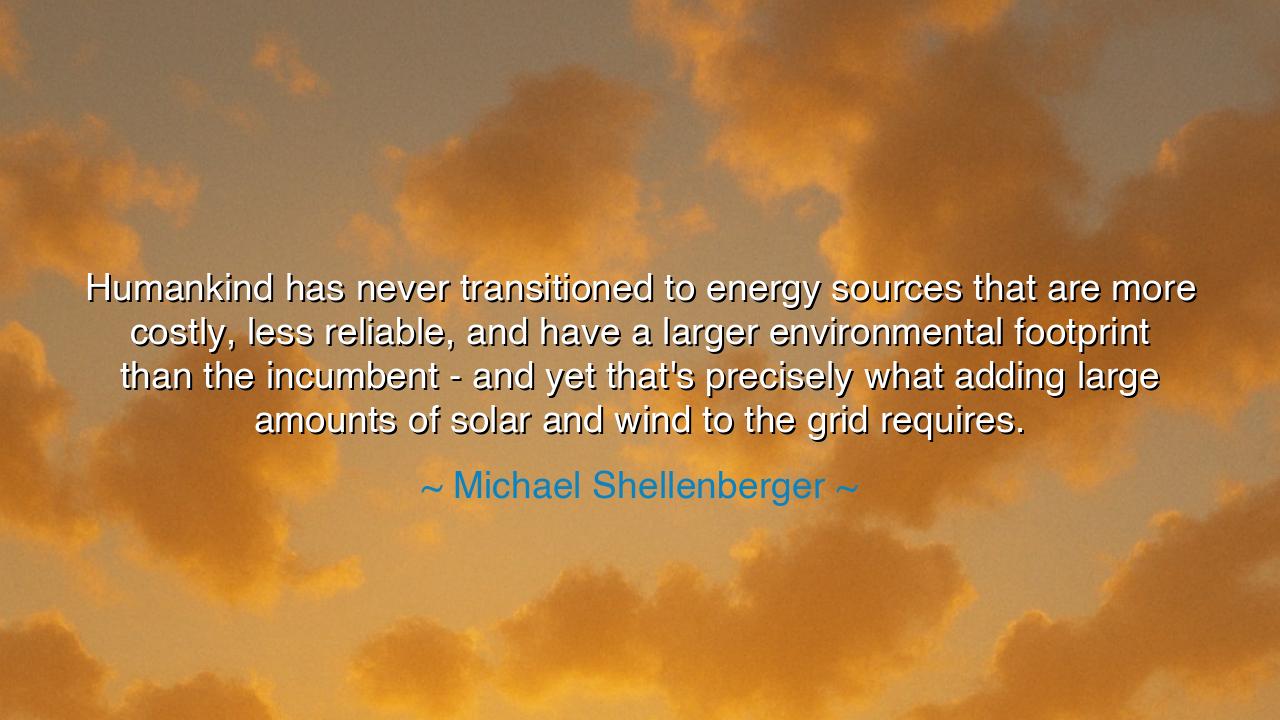
Humankind has never transitioned to energy sources that are more
Humankind has never transitioned to energy sources that are more costly, less reliable, and have a larger environmental footprint than the incumbent - and yet that's precisely what adding large amounts of solar and wind to the grid requires.






In the words of Michael Shellenberger: “Humankind has never transitioned to energy sources that are more costly, less reliable, and have a larger environmental footprint than the incumbent – and yet that’s precisely what adding large amounts of solar and wind to the grid requires.” These words are not merely an observation, but a challenge to the very spirit of our age. They remind us that history teaches one lesson clearly: mankind has always moved toward what is cheaper, stronger, and more abundant. To move in the opposite direction, to embrace what is fragile and costly, is to risk folly on a grand scale.
The ancients themselves knew that survival was tied to energy. The Greeks advanced because they mastered olive oil and charcoal; the Romans conquered the world with grain-fueled legions and aqueducts powered by gravity. Each shift in energy came because it offered more for less: more strength, more reliability, more abundance. Shellenberger warns that by rushing into solar and wind without heed, we may abandon this eternal pattern and bind ourselves to sources that are weaker, not stronger, more fragile, not more enduring.
Consider the tale of wood and coal. For thousands of years, civilizations burned wood to warm their homes and fuel their forges. But as populations grew, forests thinned, and the limitations of wood became clear. Coal, denser and more abundant, replaced it, giving birth to the Industrial Revolution. That change was not driven by idealism, but by necessity and advantage. The new energy was more powerful and less costly than the old. Shellenberger’s warning is that to leap toward renewables that demand more land, more materials, and more backup, is to reverse this natural order of progress.
History gives us further proof in the story of the oil age. In the late 19th century, whale oil lit the lamps of Europe and America. But as whales grew scarce and kerosene was refined from petroleum, the shift was immediate. The new fuel was cheaper, cleaner, and vastly more scalable. No government decree was needed to enforce this change; the logic of abundance carried it forward. Shellenberger’s words suggest that unless renewables like solar and wind can surpass the energy density and reliability of the incumbent fuels, they risk becoming a regression, not a revolution.
Yet his critique is not to dismiss the urgency of caring for the earth, but to question the wisdom of pursuing paths that may in the end wound both people and planet. For solar panels require vast tracts of land, disrupting ecosystems; wind turbines demand steel, rare earth metals, and massive concrete foundations, leaving scars on landscapes. Meanwhile, both require constant backup when the sun sets and the wind stills, meaning fossil fuels or nuclear remain in the shadows to sustain civilization. To ignore these truths is not noble idealism, but dangerous self-deception.
The deeper meaning of this quote is a call for clarity and courage. It is not enough to be swayed by the beauty of the windmill or the gleam of the solar field. We must measure carefully: the cost, the reliability, the hidden burdens upon earth and man. True progress demands that we seek not what sounds virtuous, but what endures. Just as the ancients judged the strength of a bridge not by its appearance but by its ability to hold under weight, so must we judge energy by its power to sustain civilizations without collapse.
So let this teaching endure: when choosing the sources of our strength, seek what is abundant, reliable, and enduring. Do not be misled by visions that glitter but cannot endure the storm. In your own life, weigh carefully the promises of innovation, asking always: does it give more for less, or less for more? For the future of humankind has always depended on energy, and the wisdom to choose well. And remember, as Shellenberger declares: to walk backward in the name of progress is not progress at all, but the beginning of decline.






AAdministratorAdministrator
Welcome, honored guests. Please leave a comment, we will respond soon